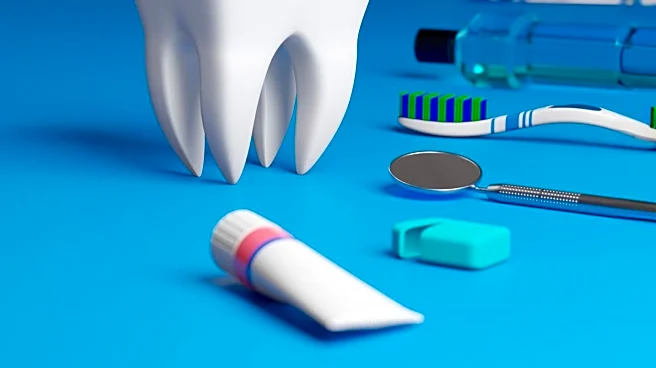What's Happening?
Recent findings highlight how dental health can serve as an indicator of broader systemic health issues. Dentists are often the first to notice signs of various health conditions through changes in oral
health. For instance, worn enamel may suggest an eating disorder, while pale gums could indicate anemia. Loose teeth might be a sign of osteoporosis, and persistent gum inflammation could point to kidney disease. Additionally, white patches in the mouth may signal oral thrush or immune system issues, and tooth enamel erosion can be caused by acid reflux. Neglecting oral hygiene might be linked to cognitive decline, and grinding teeth during sleep could be associated with sleep apnea. These oral health indicators can prompt further medical investigation, emphasizing the importance of regular dental check-ups.
Why It's Important?
The connection between oral health and systemic health underscores the importance of dental care in overall wellness. Early detection of health issues through dental examinations can lead to timely medical interventions, potentially preventing more serious conditions. This relationship highlights the need for integrated healthcare approaches where dental professionals play a crucial role in identifying health risks. As oral health can reflect nutritional deficiencies, hormonal changes, and other systemic conditions, maintaining good dental hygiene is vital not only for preventing dental problems but also for supporting general health.
What's Next?
Individuals are encouraged to pay attention to changes in their oral health and seek regular dental check-ups. Dentists may recommend further medical evaluations if they notice signs of systemic health issues during routine examinations. Healthcare providers might increasingly collaborate with dental professionals to ensure comprehensive patient care. Public health campaigns could focus on educating the public about the significance of oral health as a window to overall health, promoting preventive measures and early detection strategies.
Beyond the Headlines
The ethical dimension of this development involves ensuring access to dental care for all, as disparities in dental health can reflect broader health inequities. Culturally, there may be shifts in how oral health is perceived, with greater emphasis on its role in overall wellness. Long-term, this could lead to changes in healthcare policy, advocating for integrated health services that include dental care as a fundamental component.










